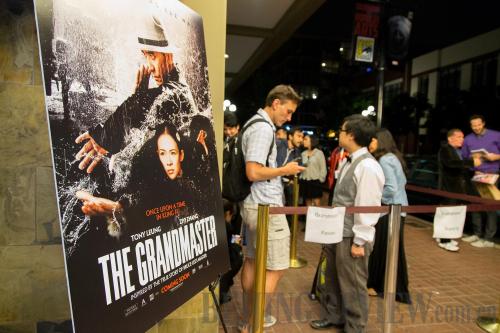|
 |
|
GRAND OPENING: Fans wait for the start of the Weinstein Co.'s midnight screening of The Grandmaster on July 20, 2013, in San Diego, California (GETTY IMAGES) |
The story of Wudang swordsman Li Mubai is one that resonated with moviegoers across the globe. The thrilling martial arts sequences, sumptuous costumes and sweeping musical score of Ang Lee's four-time Academy Award-winning Crouching Tiger, Hidden Dragon (2000) ensured its position as one of the greatest non-Hollywood films of the new millennium and the highest-grossing foreign language film in Hollywood history.
Yet the giddy heights reached by Lee's masterpiece, and the brief golden era that it sparked, has become little more than a distant memory. In the decade and a half following Crouching Tiger, Hidden Dragon, the Chinese film industry has spluttered and faltered on the international market, with 2012 marking one of its lowest international grosses in recent history.
In 2013, the year where Chinese films overtook Hollywood blockbusters in China's domestic box office and boomed to a record of more than $3 billion in domestic receipts, this success could tragically not be mirrored in the all-important North American market.
According to a report issued by the Film Bureau of the State Administration of Press, Publication, Radio, Film and Television of China, overseas box office in 2013 amounted to just 1.41 billion yuan ($231 million), a drop of 30 percent from the 2 billion yuan ($330 million) earned in 2011. The industry's lowest box-office earnings since 2005 was 1.1 billion yuan ($180 million) registered in 2012.
Foreign film drought
This downward spiral is not exclusively a Chinese trend, however. Foreign language films have always struggled to break into the North American market.
Stanley Rosen, political science professor at the University of Southern California, told Beijing Review that subtitled films make up "perhaps only 1 percent" of the films shown in America. With such a tiny proportion of the U.S. market dedicated to foreign films, even the most successful can only expect to make a relatively modest profit.
Rosen cites the example of 2013's Hong Kong-Chinese mainland production The Grandmaster, grossing $6.5 million stateside compared to its domestic gross of $50 million, as the "upper limit for Chinese films these days." Rosen believes that with the film's huge promotional and advertising costs, which helped the film pick up two Academy Award nominations, The Grandmaster's U.S. earnings may barely even amount to a profit.
"[In America] Chinese films tend to only play in the biggest cities, in communities where Chinese people live," he said.
Experts suggest that the cultural barriers between China and the United States are often too much for American audiences to overcome.
"Telling Chinese stories in a way that is easy for foreign audiences to understand is still an unsolved problem for Chinese directors," said Chinese-American film producer, Janet Yang to the Global Times.
Rosen suggests that many Americans view films set in pre-1949 China with a great deal of skepticism, often believing them to be "propaganda films."
"When Zhang Yimou or Feng Xiaogang hire well-known American actors, but make films about pre-1949 Chinese history, Americans will not respond. It's a waste of money hiring American actors if you expect that it will help you at the U.S. box office," Rosen said.
Mats Karlsson, professor of Japanese studies at the University of Sydney, told Beijing Review that Asian films dealing with World War II often lack commercial viability as their "messages become politically incorrect" when viewed by Westerners.
Karlsson believes that while Western audiences are fascinated by Asian culture, they are not interested in a Japanese or Chinese view of history. They are looking for films that confirm what Karlsson calls the "Western Orientalistic gaze."
| 